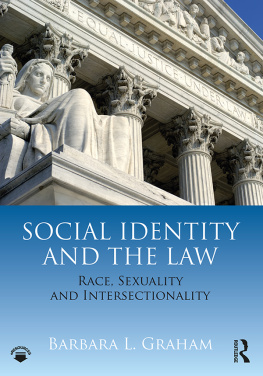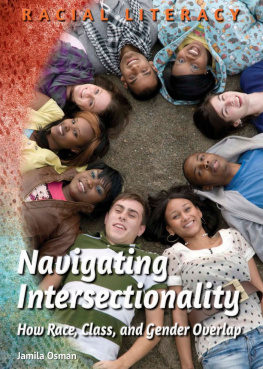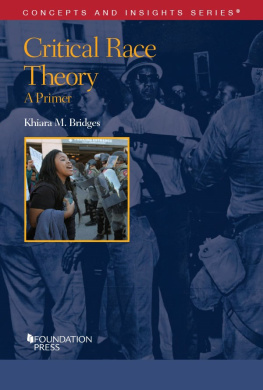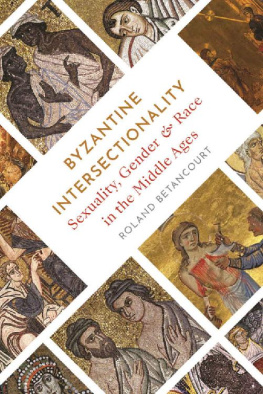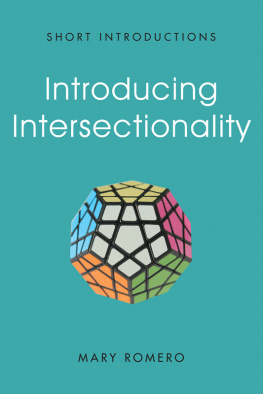Social Identity and the Law
Social Identity and the Law: Race, Sexuality and Intersectionality is an important resource for inquiry into the relationship between law and social identity in the contexts of race, sexuality and intersectionality in the United States.
The book provides a systematic legal treatment of selected historical and contemporary civil rights and social justice issues in areas affecting African Americans, Latinos/as, Asian Americans and LGBTQ persons from a law and politics perspective. It covers topics such as the legal and social construction of social identity, slavery and the rise of Jim Crow, discrimination based on national origin and citizenship, educational equity, voting rights, workplace discrimination, discrimination in private and public spaces, regulation of intimate relationships, marriage and reproductive justice, and criminal justice.
Lecturers will benefit from:
Fifty-seven excerpted cases accompanied with engaging questions presented at the beginning of each case to stimulate class discussion.
An eResource including 129 supplemental case excerpts and case briefs for all excerpted cases appearing in the book.
Suggested reading lists at the end of each chapter recommending key articles and books to help students survey the academic literature on the topics.
With a logical chapter structure and accessible writing style, this textbook is an essential companion for use on undergraduate courses on American constitutional law, civil liberties and civil rights, social justice, and race and law.
Barbara L. Graham is Associate Professor of Political Science at the University of Missouri-St. Louis. Within the field of American politics, she specializes in the area of law, courts and politics. She teaches courses on the Supreme Court, constitutional law, civil liberties, gender and the law and judicial politics. Her current research interests include race, gender and intersectional representation in state and federal courts and the relationship between law and social change.
Not only does Social Identity and the Law: Race, Sexuality and Intersectionality fill a gap in the market; it also provides a fascinatingyet accessibletreatment of legal developments affecting African Americans, Asian Americans, Latinos/as and LGBTQ persons. Instructors and students alike will appreciate Grahams careful selection and editing of court decisions, her effective writing, and the thought-provoking questions she poses in each chapter. Social Identity and the Law is so well-done that instructors will be tempted to develop a course around it; I know I am.
Lee Epstein, Ethan A.H. Shepley Distinguished University Professor, Washington University in St. Louis
First published 2019
by Routledge
711 Third Avenue, New York, NY 10017
and by Routledge
2 Park Square, Milton Park, Abingdon, Oxon, OX14 4RN
Routledge is an imprint of the Taylor & Francis Group, an informa business
2019 Taylor & Francis
The right of Barbara L. Graham to be identified as author of this work has been asserted by her in accordance with sections 77 and 78 of the Copyright, Designs and Patents Act 1988.
All rights reserved. No part of this book may be reprinted or reproduced or utilised in any form or by any electronic, mechanical, or other means, now known or hereafter invented, including photocopying and recording, or in any information storage or retrieval system, without permission in writing from the publishers.
Trademark notice: Product or corporate names may be trademarks or registered trademarks, and are used only for identification and explanation without intent to infringe.
Library of Congress Cataloging-in-Publication Data
Names: Graham, Barbara Luck, author.
Title: Social identity and the law: race, sexuality, and intersectionality /
Barbara L. Graham.
Description: Abingdon, Oxon [UK]; New York, NY: Routledge, 2019. | Includes
bibliographical references and index.
Identifiers: LCCN 2018023709 | ISBN 9781138478824 (hardback) |
ISBN 9781138478831 (pbk.) | ISBN 9781351067096 (epub) |
ISBN 9781351067065 (mobipocket/kindle)
Subjects: LCSH: Sociological jurisprudence. | LawSocial aspects. |
Race discriminationLaw and legislation. | DiscriminationLaw and legislation. |
Group identity. | Sex and law. | Criminal justice, Administration of.
Classification: LCC K376.G73 2018 | DDC 340/.115dc23
LC record available at https://lccn.loc.gov/2018023709
ISBN: 978-1-138-47882-4 (hbk)
ISBN: 978-1-138-47883-1 (pbk)
ISBN: 978-1-351-06757-7 (ebk)
Typeset in Sabon
by codeMantra
Visit the eResources: www.routledge.com/9781138478831
To Christopher and Matthew
Social Identity and the Law: Race, Sexuality and Intersectionality offers an engaging and accessible approach to the study of the relationship between law and social identity in the United States. The books target audience is undergraduate students, the general reader and instructors. The book examines how law and courts have addressed group demands for equality and social justice along racial, gendered and intersectional lines in the United States. The book provides an introduction to the legal treatment of historical and contemporary civil rights and social justice issues in areas affecting people of color and LGBTQ persons from a law and politics perspective.
Utilizing a case law approach, the book contains fifty-seven excerpted cases accompanied by the factual background of each case. In addition to Supreme Court cases, I include lower federal court cases at the district and appellate levels, as well as state Supreme Court opinions. Rather than place discussion questions at the end of the chapter, engaging questions are presented at the beginning of each case to reinforce learning and stimulate discussion. The cases are carefully edited to avoid lengthy excerpts, and concurring and dissenting opinions are included to illustrate disagreements among lower court judges and Justices. Case briefs accompany all excerpted cases in the text and I include on the books website 129 supplemental cases that are mentioned in the text. A complete list of supplemental cases by chapter appears at the end of the book.
The book is organized topically. examines how the U.S. Constitution, law and courts reinforced slavery, white supremacy and racial hierarchy from 1787 until 1896. The remaining chapters focus on discrimination based on national origin and citizenship, educational inequities, voting rights, workplace discrimination, discrimination in private and public spaces, regulating intimate relationships, reproductive justice and criminal justice. The legal policy areas examined in this book include both constitutional and statutory cases. It is my hope that this book will broaden the readers understanding of race, sexuality and intersectionality from a law and social justice perspective.

